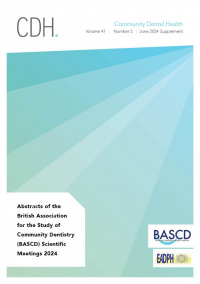December 2007
Editorial - The STROBE initiative and its implications for dental public health research
Abstract
In recent years, an armoury of guidelines and checklists has been produced to assist researchers in the conduct and reporting of biomedical studies. The information contained in these publications has been of considerable benefit to the scientific community and interested clinicians, and has greatly enhanced the drive towards evidence-based clinical practice. The material is the outcome of deliberations by groups of leading authorities, closely involved in the various types of experimental, descriptive and review studies covered, and in their reporting and publication. It represents a repository of expertise that only existed fragmentarily hitherto. The intention of the producers of the various documents, and the leading biomedical journals to which many of them are affiliated, is to ensure that published material is the soundest and most reliable available, and to refine and codify the reporting of the advances taking place continually in the biomedical field. The principles put forward, aimed at setting standards and determining courses of action in the conduct and reporting of research, are making a major contribution to systematising investigations into the distribution of diseases and disorders in human populations and their determinants. Important among the collection of manuals, working documents and guidelines hitherto published are those concerned with the reporting of randomised controlled trials (RCT), exemplified by the CONSORT statement (Altman, 1996); those dealing with the conduct and reporting of meta-analyses, notably the QUORUM statement – Quality of Reporting of Meta-analyses (Clarke, 2000); those covering systematic reviews of RCTs, specifically the guidelines and training manuals (including the QUORUM statement) promulgated by the Cochrane Collaboration, www.cochrane.org, (named after the celebrated medical epidemiologist who inspired its creation); and those advising on the conduct and reporting of systematic reviews of both RCTs and observational studies (NHS Centre for Reviews and Dissemination, 2001). The authors of these documents have an ongoing interest in revisiting and updating them. They come together regularly to review feed back from interested outside parties and to reconsider and modify their published guidance. A revised version of the CONSORT statement for the reporting of parallel-group randomised trials, for example, appeared in 2000 and it is understood a further version is in development.




